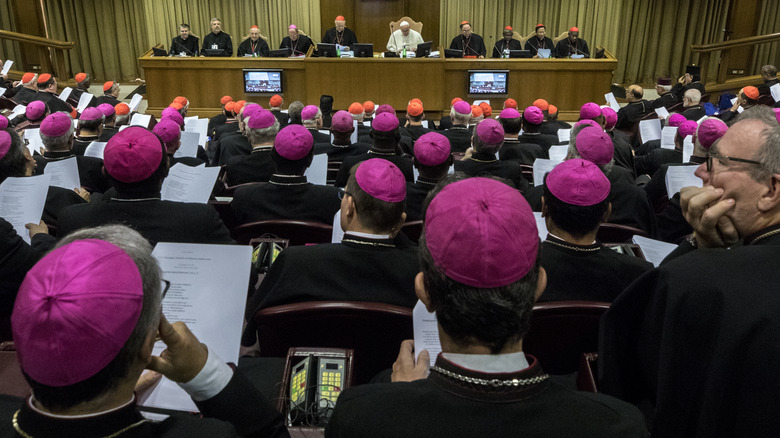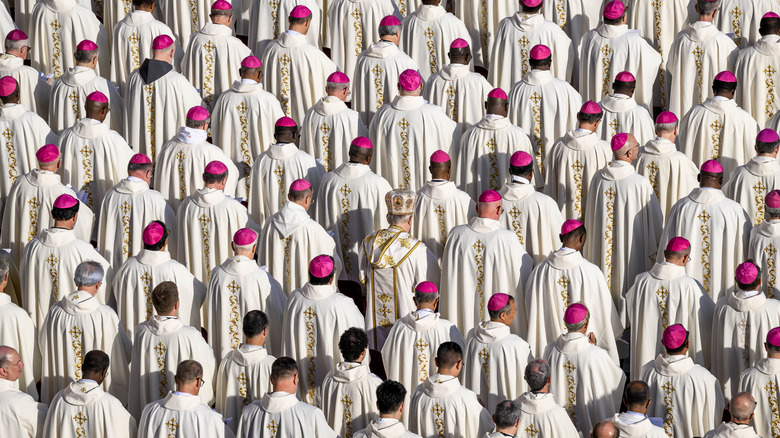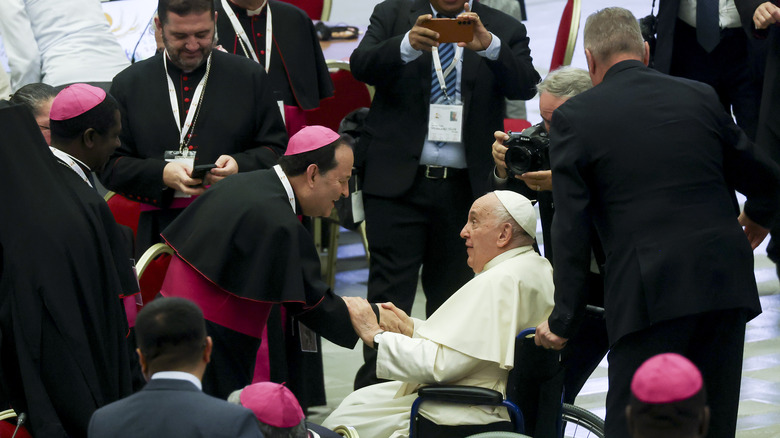What Is The Catholic Church's Synod Of Bishops?
In ancient Greek, "synodos" was a two-part word, combining "syn" (same) and "hodos" (road or way) according to The Arlington Catholic Herald. That evolved into "synod," which in Catholicism came to mean a gathering of church authorities and lay members to discuss the governance of the church and the best way to follow the teachings of Christianity. Per Vatican News, synods in the early church could be overseen by local or metropolitan bishops or the patriarch, but the need soon came for an assembly to discuss the church as a whole. From the synods came the Ecumenical Councils. Such advisory meetings have been a regular part of Catholicism ever since.
The Synod of Bishops as a distinct, permanent body, however, is a relatively recent development. It was established (per The Holy See) in 1965 by Pope Paul VI in the wake of the Second Vatican Council, though the idea had been discussed even before that assembly. The synod is called to Rome from time to time by the pope to offer consultation on various matters, often a particular issue of the day. Per Britannica, 15% of the body is appointed by the pope, while the rest are elected by the bishops themselves from any given nation. The Arlington Catholic Herald described the synod as an attempt to continue the collegiality of Vatican II, though some have noted that the body is strictly advisory and was, by design, entirely subject to the pope's authority (per "What Happened at Vatican II").
The synodal assemblies have a lot of prep work
The process by which the synod of bishops is called and its agenda for a given conference set is described by The Holy See. Various institutions within the Catholic hierarchy confer to select a topic for a given assembly. The conditions for a topic are that it has a universal application to the Catholic Church, that it be a contemporary issue with the potential to generate fresh enthusiasm from within, that it be grounded in doctrine and have a "pastoral focus," and that any decision reached on the topic could reasonably be accomplished. When a shortlist is drawn up, it is submitted to the pope, who makes the final decision about what the synodal assembly will be about.
The topic is developed in a document called the lineamenta, which is subject to papal approval before being disseminated among the episcopates for comment. After more preparatory back-and-forth, the participating bishops gather for the assembly, which goes through three phases: presentations by each member, a discussion period divided into small groups, and final preparations of suggestions for the pope on the topic at hand.
There were 11 ordinary assemblies of the synod, seven special assemblies (by region), and two extraordinary assemblies as of 2007 when The Holy See published a summary; there have since been five more, with the 16th ordinary assembly beginning in 2023 (per the Catholic News Agency).
The role of the synods has expanded under Pope Francis
Topics covered by past ordinary assemblies of the synod of bishops have included in the world, the eucharist, and the bishops themselves (per The Holy See). In all these, the synod has kept to its advisory role. But since the election of Pope Francis, the role of synods in the church has been called into question. Francis, who presided over his first synod in 2015 (the topic was the mission of family in the modern world vis a vis the church) has sought to expand their influence in decision-making. "Listening is more than simply hearing," he has said (per The Arlington Catholic Herald).
His designs for the synods are one of a number of areas where Francis has come into conflict with more conservative elements of the church. Ahead of the 16th Ordinary Assembly, which will grant voting rights to women and laity for the first time, traditionalist cardinals made public their letters complaining about the synod and its topic of synodality (per The New York Times). They expressed fears that the assembly could lead to overturning church doctrine on same-sex unions and the hierarchy of the institution.
Just how much change the ongoing 16th synod will bring is unclear. Per USA Today, the voting laity is greatly outnumbered by the bishops. And Francis criticized a more zealous synod in Germany early in 2023 with liberal aims (per AP). But his granting a role to laity at all remains unprecedented.


